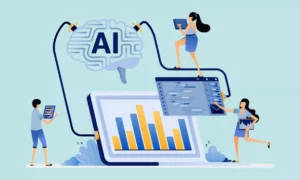Silicon Valley’s most profitable assumption just got a legislative challenge. For years, AI companies have treated the internet like an all-you-can-eat buffet, training their models on whatever content they could scrape. A new congressional bill wants to put that feast behind a paywall.
The proposed legislation would fundamentally alter the rules of engagement between artificial intelligence developers and content creators. Instead of the current free-for-all approach, companies would need explicit permission before using someone’s work to train their systems.
A Rare Display of Bipartisan Anger
When Josh Hawley and Richard Blumenthal agree on something, the tech industry usually takes notice. These senators typically occupy opposite ends of the political spectrum, yet both have grown frustrated watching AI companies build billion-dollar businesses on other people’s intellectual property.
Their solution arrives in the form of the AI Accountability and Personal Data Protection Act, introduced this week with language that pulls no punches. The legislation creates a new federal cause of action, giving individuals the legal ammunition to sue companies that train AI systems on copyrighted material or personal information without clear, upfront consent.
This isn’t a minor policy adjustment. Every major AI system currently in operation learned by consuming massive amounts of web content without asking permission first. ChatGPT, Google’s Bard, Claude, and countless other models exist because their creators assumed that fair use doctrine would protect them from legal challenges.
That assumption has faced increasing scrutiny in courtrooms. Just last month, a group of authors lost their case against Anthropic, with a federal judge ruling that the company could legally use copyrighted books to train Claude without compensating the writers or seeking their approval.
Hawley’s response was immediate and pointed: “AI companies are robbing the American people blind while leaving artists, writers, and other creators with zero recourse. My bipartisan legislation would finally empower working Americans who now find their livelihoods in the crosshairs of Big Tech’s lawlessness.
The Economics Behind the Outrage
The frustration extends beyond philosophical disagreements about intellectual property. Content creators are watching their economic foundations erode in real time. Publishers describe the current landscape as a “traffic apocalypse,” with AI-powered search results and chatbots providing direct answers that eliminate the need for users to visit original sources.
Consider the mathematics. A news website invests resources in reporting, writing, and publishing an article. Google’s systems crawl that content, incorporate the information into their knowledge base, then serve AI-generated summaries that answer user questions without sending traffic back to the original publisher. The website bears the costs while Google captures the economic value.
This dynamic has accelerated dramatically with the introduction of AI Overviews and similar features across major search platforms. Users get their information faster and more conveniently, but the content creators who produced that information see their visitor numbers and advertising revenue decline.
Blumenthal framed the issue in terms of basic fairness: “Consumers must be given rights and remedies, and legal tools to make them real, not relying on government enforcement alone.”
Redefining the Rules of Consent
The proposed legislation sidesteps the complex fair use debate by establishing new requirements for data collection and usage. Under these rules, companies would need to obtain explicit permission before using what the bill defines as “covered data” for AI training purposes.
The definition of covered data proves surprisingly comprehensive. It includes obvious categories like copyrighted works and personally identifiable information, but also extends to device identifiers, IP addresses, location data, browsing histories, purchase patterns, and behavioral information used for user profiling.
The consent requirements themselves are notably rigorous. Companies cannot bury these requests in lengthy terms of service agreements or simply provide links to detailed privacy policies. All permissions must be clearly stated upfront, and businesses cannot make their products unusable for customers who decline to share their data unless that information is genuinely necessary for the service to function.
The legislation also takes direct aim at arbitration clauses that typically prevent consumers from filing lawsuits against technology companies. Under the proposed law, these agreements would be unenforceable when it comes to improper data collection or usage, potentially opening the floodgates for class action litigation.
Industry Implications and Resistance
The potential impact on AI development cannot be understated. Current machine learning approaches depend on access to enormous datasets, often assembled by scraping publicly available content across the web. Requiring explicit permission for each piece of training data would dramatically increase costs and complexity for AI companies.
Some industry observers argue this could actually benefit larger technology companies with existing content partnerships and licensing agreements, while making it harder for smaller AI startups to compete. Google, Microsoft, and Meta have already signed deals with some major publishers, giving them advantages in a permission-based training environment.
The legislation also reflects a broader shift in how policymakers view artificial intelligence development. The traditional Silicon Valley approach of “move fast and break things” worked when the potential consequences were relatively contained. AI systems that can generate human-quality text, create realistic images, and potentially automate entire categories of knowledge work represent a different scale of technological impact.
The Road Ahead
The bill’s future remains uncertain. After being introduced Monday, it was referred to committee, but the Senate Judiciary Committee has not announced when it might consider the legislation. Even if it advances, the proposal would face intense lobbying from some of the world’s most powerful corporations.
Yet the momentum behind AI regulation continues building across multiple fronts. The European Union Parliament recently commissioned research concluding that AI training does not qualify as fair use under existing legal frameworks. The head of the US Copyright Office made similar arguments last month, though those statements may have contributed to his departure from the position.
What we’re witnessing represents more than isolated policy proposals. The fundamental assumptions that allowed AI companies to build their systems by freely consuming online content are being questioned at the highest levels of government. Whether through this specific legislation or future bills, some form of reckoning appears increasingly likely.
For content creators, the proposed changes offer hope for more equitable treatment in an AI-driven economy. Instead of watching their work get monetized by others while competing for the same audiences, they might finally gain meaningful leverage in determining how their material gets used.
For AI companies, the implications are more complex but not necessarily catastrophic. Higher development costs and more complicated data acquisition processes seem inevitable if consent requirements become law. However, clearer legal frameworks might actually reduce uncertainty and provide more stable foundations for long-term business planning.
The real question isn’t whether AI regulation will emerge, but whether it will strike the right balance between innovation and fairness. Where do you think that balance should fall?



























